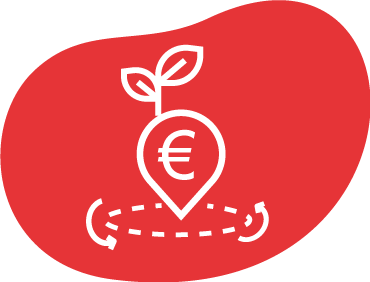Continue the commitment to support the diversification of activities and functions of rural areas, harnessing local strengths, knowledge and opportunities and providing greater support for small and micro scale projects, especially promoted by young people and unemployed, avoiding their leaving for the cities.
Flagship: Supporting entrepreneurship and the social economy in rural areas
The Social Economy Action Plan (SEAP), adopted in December 2021, includes specific actions for rural areas such as:
- supporting Member States and stakeholders to boost the social economy and social innovation in rural areas through the future EU network for the Common Agricultural Policy;
- expanding the European Social Economy Regions network to reinforce new regional and local partnerships to boost digital and green transitions in territories;
- enhancing networking between rural businesses through the Enterprise Europe Network, as well as through calls for inter-regional cooperation through the European Social Economy Missions.
In September 2023 there has been a call for proposals under the Single Market programme (SMP) that will select up to four projects that will focus on supporting social economy initiatives in rural areas to ensure community resilience and better living conditions.
On 30 November 2022, the EU CAP network organised the workshop on “Young entrepreneurs - Engines of innovation in rural areas” to highlight good practices from EU-funded programmes and leadership examples from local communities, and innovators in rural communities.
The social economy action plan will keep supporting rural areas, by:
- encouraging Member States to set up local social economy contact points for them to offer peer-to-peer support in rural regions to facilitate access to EU and national funding for social economy enterprises and liaising with authorities managing EU funds;
- ensuring synergies with activities developed under the rural pact on social economy, in line with the good practice webinar on social economy in rural areas organised in May 2023;
- publishing a study of the benefits of embracing digital and green transition with examples of rural areas under the transition pathway process.
The Commission works with stakeholders to promote SMEs retail in rural areas. The actions taken aim at exchanging best practices of retail SMEs. The Commission:
- has organised in cooperation with the Slovenian EU Council presidency a #Revitalise Retail workshop that discussed the digitalisation of retail SMEs with a focus on rural areas (Dec. 2021);
- has organised a Revitalise Retail workshop in Barcelona(Dec.2023) with the Spanish EU Council presidency;
- will conduct a study on experiences of retail SMEs who have successfully embraced innovative green and digital solutions and transformed their business models to respond to changing consumer habits, including a rural angle;
- cooperates with the OECD in a project on building indicators on the competitiveness on retail SMEs on local level;
- will showcase cities that support the green and digital transition of local retail SMEs which keep their city centers vibrant, under the preparatory action European Capital of Small Retail.
Learn more about social economy in the EU.
Discover the project EYE in rural (ERASMUS+).
Funding opportunity
The Commission called for proposals, under the Single Market programme, to support transnational partnerships to boost the capacity of SMEs in “proximity and social economy” to green their operations, and innovate with their products, services and processes.
The call covered training, coaching, capacity building, peer learning, incubation, job shadowing or awareness raising activities. Social economy enterprises in rural areas can benefit from this project.
Encouraging education, training and employment opportunities for young people in rural areas
The Commission:
- monitors the implementation of the reinforced Youth Guarantee, a commitment by the EU Member States that all young people under 30 receive a good quality offer of employment, continued education, apprenticeship or traineeship, including in rural and remote areas;
- foresees important initiatives to foster the quality and inclusiveness of national education and training systems, which will have an impact on rural and remote areas, under the European Education Area (EEA).
The Commission collaborates with Member States, other countries and stakeholders via Working Groups to share information about reforms of national education policies:
- the working group on equality and values in education and training took place in Paris (France) in December 2022 and focused on the theme of ‘addressing social and territorial inequalities in and through education’. It touched upon the rural-urban divide in terms of educational inequalities.
Actions under the EEA contributing to rural areas:
- the European School Education Platform features dedicated content on school education in rural areas, including good practices, articles, and expert opinions;
- eTwinning – the online community for teachers – includes a priority on rural and outermost areas of Europe. A discussion group on small/remote and rural schools was launched end of 2022 to help small schools share practice examples and discuss teaching and learning methodologies.
On 29 November 2021, the Council of the EU adopted a recommendation on blended learning approaches for high-quality and inclusive primary and secondary education. The recommendation recognises that access to schools must be guaranteed and that blended learning approaches are an opportunity for rural and remote areas.
On 28 November 2022, the Council of the EU adopted the Recommendation on Pathways to School Success. The recommendation acknowledges specific challenges for rural and remote areas and highlights the need for rural and remote areas to have equal access to quality education and life-long learning.
The implementation of recommendations is done via the working groups with the Member States on different topics.
Learn more about the reinforced Youth Guarantee and the European Education Area.
Promoting the development of a sustainable bioeconomy in rural areas
The Communication on the EU Forest strategy, adopted in July 2021, aims to:
- support EU forest managers to provide new business opportunities and remunerate land management through the Common Agricultural Policy;
- achieve the EU’s biodiversity objectives by 2030;
- meet the greenhouse gas emission reduction target by 2030 and climate neutrality by 2050.
In this context, rural municipalities that have a sizeable forest area have a major role to play in developing the bioeconomy. Through a dedicated EU CAP network focus group, the Commission promoted the creation of a network of forest dominant rural municipalities, of which the first meetings have already taken place.
Furthermore, targeted funding to support sustainable land and forest management, including investments and cooperation for bioeconomy, carbon farming and bioeconomy, is available through implementation of the 28 CAP strategic plans.
Progress on the development of the EU Bioeconomy Strategy was published in May 2022, and a “bioeconomy changemakers festival” was organised in March 2024.
In addition, the EU regulatory framework for carbon removals, adopted in November 2022, defines quality criteria of carbon removal certificates, including from product of the bioeconomy able to store carbon for a long time.
Supporting the role of producer organisations and producer groups in rural development
Local producers strengthen the social fabric in rural areas and contribute to increasing the standard of living in rural areas.
The Commission is:
- addressing the role of producer organisations (POs) and producers of Geographical Indications (GIs) and their contribution to rural development via a series of mini conferences in Member States, events and workshops;
- empowering POs via a forum to share best practices in the agri-food supply chain to further strengthen their position in the supply chain;
- supporting producer groups of geographical indications with new tools to strengthen their position in the food supply chain via a series of conferences.
The revision of the regulation of EU Geographical Indications for wine, spirit drinks, agricultural products for agricultural products tabled by the Commission in 2022 has been adopted by the Council on 26 March 2024.
Learn more about actions regarding producer organisations and geographical indications.


